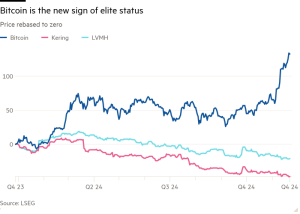Russia steps up Ukraine attacks with strike on ship in Odesa port
Stay informed with free updates
Simply sign up to the War in Ukraine myFT Digest — delivered directly to your inbox.
Russia has struck a cargo ship moored in the Ukrainian port of Odesa, raising concerns about the safety of a maritime corridor that has become a vital export channel for Kyiv’s agricultural commodities.
A strike late on Monday using two Iskander-M ballistic missiles damaged the Palau-registered Optima cargo ship, killing one Ukrainian and injuring five foreign crew members, according to Odesa’s authorities. Four of the injured are in serious condition, they said.
It was the second strike on Odesa port in two days. On Sunday, the Saint Kitts and Nevis-flagged Paresa, a cargo ship loaded with grain and corn, was damaged. The attack was followed by a mass drone attack on the region, early on Tuesday damaging an administrative building in Odesa and causing a fire across three floors of an apartment block in the city of Chornomorsk.
According to Kyiv officials, Russia has hit 21 cargo vessels after it pulled out of a year-long, UN-brokered grain export deal. Ukraine then began exporting goods from its ports under the cover of its coastal air defence systems.
Ukraine’s reconstruction minister Oleksiy Kuleba said the attacks were an attempt to “disrupt the successful work” of the export corridor.

Weekly grain exports increased 56 per cent to 11.2mn tonnes this September, from 7.2mn tonnes last October, according to data published by the country’s agriculture ministry on Monday. Kuleba said Ukraine had exported 70mn tonnes of grain using 2,500 ships over the past year.
Odesa’s sea and river ports have been hit about 200 times since July 2023, according to data shared by regional authorities with the Financial Times. To target the ports Russia mainly uses ballistic missiles that can strike within minutes of being launched, making them difficult to intercept.
The aim of Russia’s attacks can “only be to increase instability in sensitive regions of the world that depend on food imports”, said Kuleba.
Backed by Ukraine, insurance firm Marsh McLennan brokered a deal last November to provide risk cover for vessels departing from Ukraine. Brokers have urged insurers to “ditch” arbitrary exclusions for Ukraine.
Odesa seaport authorities told the FT that businesses have taken to storing their goods further inland to mitigate the risk. They added that although the port had been damaged, it would take a “nuclear weapon [to] take out an entire port”.
Businesses have also exported good through the Odesa region’s Danube river ports that lead to Romanian territorial waters.
Ambrey, a UK maritime intelligence company, advised shipping groups to “conduct comprehensive dynamic voyage threat assessments” and for crew members to stay within their vessels during an attack.
Russia’s defence ministry has not yet commented on Monday’s attack. It said the cargo vessel damaged on Sunday was a Ukrainian military ship, without providing any evidence for the claim.
#Russia #steps #Ukraine #attacks #strike #ship #Odesa #port




